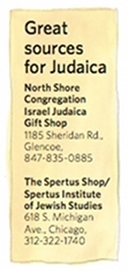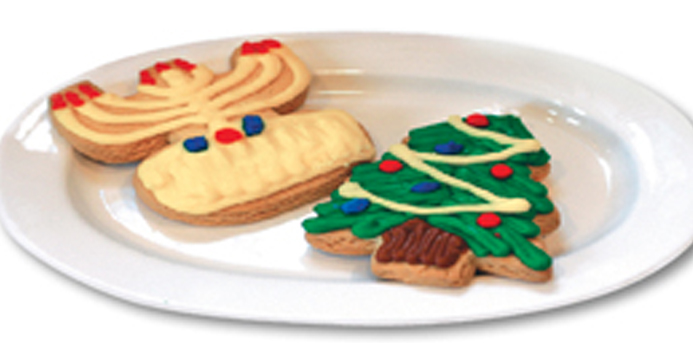The store aisles are filled to overflowing with beautifully crafted velvet tree skirts, hand-stitched stockings, boxwood wreaths and elegant blown-glass ornaments. I am drawn … but today I am searching for something else. Where, I wonder, can I find a tablecloth for our Hannukah dinner?
“Oh, you’re looking for Hanukkah decorations,” says the impatient store clerk. “I’ll get the ladder. We’ve got a few plastic dreidels, a polyester silver and blue tablecloth, a ceramic menorah and a felt thingy with Jewish star appliques.”
Ah, Hanukkah, decorationally challenged and ambiguously spelled. (Do we “ch” or don’t we? One “k” or two?)
“I recognize that Hanukkah does not equal Christmas,” says Rabbi Sam Gordon of Congregation Sukkat Shalom (sukkatshalom.org) in Wilmette. Gordon points out that Passover and the High Holidays trump Hanukkah in both religious and historical significance.
But for us American Jews and for the growing number of multi-religious families, especially on the North Shore, we struggle with the December dilemma, the inherent draw of Christmas versus an obligation to Hanukkah.
Gordon knows about blending traditions. At “The Churple” (Sukkat Shalom’s unofficial nickname because it shares space with the First Community Church of Wilmette), interfaith couples comprise more than half of the congregants.
The December Dilemma travels beyond The Churple. A self-proclaimed group of “cashews,” Catholic parishioners from Old St. Pat’s Church (oldstpats.org) in the city who are married to Jews, meet monthly to find ways to keep all parties happy, especially around the holidays.
“The focus should be on the families’ core values instead of specific rituals. It’s not important whether or not you choose to have a tree, it’s about honoring your family’s core values and bringing the sacred into your home,” Gordon says.
Still, for Jewish parents, even with our rallying cry of “we got eight nights,” it’s an almost impossible sell against Santa.
”My husband Josh, who was raised Jewish, grew up with a bad case of Christmas envy,” says Susan McLaughlin Karp, a Sacred Heart-educated Catholic who returned with Josh to their native Glencoe to raise their four sons.
 McLaughlin-Karp, a consummate entertainer and decorator, transforms their home each December with an elaborate array of sparkling lights, precious collectibles, poinsettias and, of course, a towering tree with hundreds of ornaments and a train set underneath.
McLaughlin-Karp, a consummate entertainer and decorator, transforms their home each December with an elaborate array of sparkling lights, precious collectibles, poinsettias and, of course, a towering tree with hundreds of ornaments and a train set underneath.
Hanukkah gets a much smaller billing—a menorah, a few knickknacks and silvery-blue collars for the dogs.
But after a lifetime of Christmases, McLaughlin-Karp wishes her husband didn’t so readily embrace her traditions. “Frankly, I wish it was more mellow. All the baking and gift-giving and wrapping and decorating and socializing is exhausting, like I’ve suddenly begun working the night shift,” she says.
Like the Karps, other interfaith families try to give their kids Christmas, just in its more secular incarnation.
“What does a gingerbread house have to do with Jesus?” says Elizabeth Bohart, a Jewish mother of three girls with her Protestant husband.
Humor aside, Rabbi Gordon wants us to remember that our homes are sacred places, and that what really matters, especially at the holidays, is to focus on our families’ core values.
“Your contract is to make the world a better place every day and to make yourself better every day,” Gordon says.
Simple. But how do I decorate for Hanukkwanzaa?

